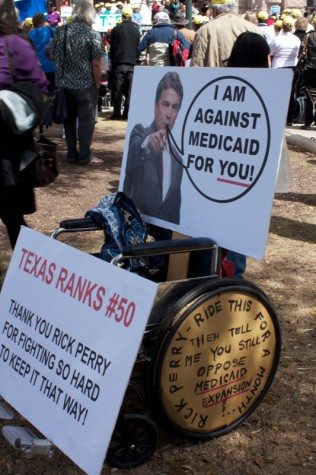The Observer reports on the launch of Texas Left Me Out.
Members of the coalition pointed to two different studies that estimate that thousands of uninsured Texans with chronic conditions are likely to die as a result of not expanding Medicaid.
A Harvard University/CUNY study released last week predicts between 1,840 to 3,035 deaths. Another study, by a University of Texas Medical Branch researcher, projected approximately 9,000 preventable deaths per year. Dr. Robert Luedecke of Doctors for America, a national coalition for healthcare reform, said the death toll associated with the uninsured is something many lawmakers won’t talk about.
“What would people do if they didn’t have health insurance?” Luedecke said of critically ill patients who put off seeing a doctor because they can’t afford it. “They would just die—that’s what they’d do.”
Linda Berman, 63, is one of those who says she’s been left out by Texas. She’s languishing in the coverage gap while dealing with diabetes and high-blood pressure. As a small business owner teaching Science, Technology, Engineering and Mathematics (STEM) skills to kids through a traveling workshop, Berman said she’s left with little to no taxable income at the end of the year. The cheapest individual private plan she’s found comes with a $450 monthly premium—out of her price range. She makes too little to qualify for subsidies on the marketplace and she’s never been eligible for Medicaid under Texas’ strict eligibility standards. Two years ago, Berman racked up $70,000 in medical debt after she was hospitalized.
“I knew I had no money to pay for [the visit] but had I not [paid out of pocket], they wouldn’t have saved my life,” Berman said.
Not long after her hospitalization, a debt counselor told her that she would never be able to pay off her medical debts. Berman soon filed for bankruptcy. The hospital was left holding the bill.
“People without insurance don’t get preventative care,” Berman said. “You don’t die of diabetes, you die of complications.”
See here and here for the background. The Trib also tells Ms. Berman’s story, and adds this extra bit of context to the situation.
State Rep. John Zerwas, R-Richmond, who led efforts to craft “a Texas solution,” said he hoped that the period between legislative sessions would give lawmakers a chance to work on a road for reform. However, he said he wasn’t sure that this particular coalition would have a significant impact, and he said a coalition of businesses concerned with health care issues would have a stronger impact. He said a business-focused coalition would “resonate especially with the conservative Legislature.”
Texas has declined billions of dollars from the federal government to assist with Medicaid expansion and will lose $100 billion in federal funds over a 10-year span, according to a report by Billy Hamilton, a tax consultant and former deputy comptroller, for Texas Impact and Methodist Healthcare Ministries of South Texas Inc. The federal government would cover 100 percent of the Medicaid expansion enrollees’ health care costs from 2014 to 2016, then gradually lower its share of the costs to 90 percent over ten years, resulting in 10 percent of financial responsibility for the state by 2020.
The Texas Association of Business, local government officials, and the state’s largest medical associations, including the Texas Hospital Association, and Texas Medical Association, pushed lawmakers to expand Medicaid during the 2013 session, but the issue still failed to gain traction among Texas’ conservative leadership.
Rep. Zerwas has been an honorable actor in this saga, but I don’t know what he’s talking about here. Look at that last paragraph and the supporters of Medicaid expansion in it. If that’s not a sufficiently business-focused coalition to resonate with the Lege, who else is there? We need a change of leadership at the top. That’s the only way this is moving forward.

